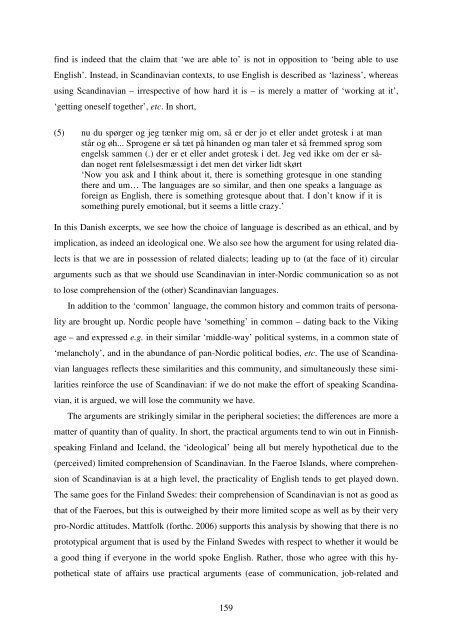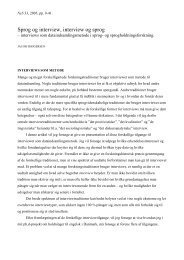Hør dog hvad de siger - Note-to-Self: Trials & Errors
Hør dog hvad de siger - Note-to-Self: Trials & Errors
Hør dog hvad de siger - Note-to-Self: Trials & Errors
You also want an ePaper? Increase the reach of your titles
YUMPU automatically turns print PDFs into web optimized ePapers that Google loves.
find is in<strong>de</strong>ed that the claim that ‘we are able <strong>to</strong>’ is not in opposition <strong>to</strong> ‘being able <strong>to</strong> use<br />
English’. Instead, in Scandinavian contexts, <strong>to</strong> use English is <strong>de</strong>scribed as ‘laziness’, whereas<br />
using Scandinavian – irrespective of how hard it is – is merely a matter of ‘working at it’,<br />
‘getting oneself <strong>to</strong>gether’, etc. In short,<br />
(5) nu du spørger og jeg tænker mig om, så er <strong>de</strong>r jo et eller an<strong>de</strong>t grotesk i at man<br />
står og øh... Sprogene er så tæt på hinan<strong>de</strong>n og man taler et så fremmed sprog som<br />
engelsk sammen (.) <strong>de</strong>r er et eller an<strong>de</strong>t grotesk i <strong>de</strong>t. Jeg ved ikke om <strong>de</strong>r er sådan<br />
noget rent følelsesmæssigt i <strong>de</strong>t men <strong>de</strong>t virker lidt skørt<br />
‘Now you ask and I think about it, there is something grotesque in one standing<br />
there and um… The languages are so similar, and then one speaks a language as<br />
foreign as English, there is something grotesque about that. I don’t know if it is<br />
something purely emotional, but it seems a little crazy.’<br />
In this Danish excerpts, we see how the choice of language is <strong>de</strong>scribed as an ethical, and by<br />
implication, as in<strong>de</strong>ed an i<strong>de</strong>ological one. We also see how the argument for using related dia-<br />
lects is that we are in possession of related dialects; leading up <strong>to</strong> (at the face of it) circular<br />
arguments such as that we should use Scandinavian in inter-Nordic communication so as not<br />
<strong>to</strong> lose comprehension of the (other) Scandinavian languages.<br />
In addition <strong>to</strong> the ‘common’ language, the common his<strong>to</strong>ry and common traits of persona-<br />
lity are brought up. Nordic people have ‘something’ in common – dating back <strong>to</strong> the Viking<br />
age – and expressed e.g. in their similar ‘middle-way’ political systems, in a common state of<br />
‘melancholy’, and in the abundance of pan-Nordic political bodies, etc. The use of Scandina-<br />
vian languages reflects these similarities and this community, and simultaneously these simi-<br />
larities reinforce the use of Scandinavian: if we do not make the effort of speaking Scandina-<br />
vian, it is argued, we will lose the community we have.<br />
The arguments are strikingly similar in the peripheral societies; the differences are more a<br />
matter of quantity than of quality. In short, the practical arguments tend <strong>to</strong> win out in Finnish-<br />
speaking Finland and Iceland, the ‘i<strong>de</strong>ological’ being all but merely hypothetical due <strong>to</strong> the<br />
(perceived) limited comprehension of Scandinavian. In the Faeroe Islands, where comprehen-<br />
sion of Scandinavian is at a high level, the practicality of English tends <strong>to</strong> get played down.<br />
The same goes for the Finland Swe<strong>de</strong>s: their comprehension of Scandinavian is not as good as<br />
that of the Faeroes, but this is outweighed by their more limited scope as well as by their very<br />
pro-Nordic attitu<strong>de</strong>s. Mattfolk (forthc. 2006) supports this analysis by showing that there is no<br />
pro<strong>to</strong>typical argument that is used by the Finland Swe<strong>de</strong>s with respect <strong>to</strong> whether it would be<br />
a good thing if everyone in the world spoke English. Rather, those who agree with this hy-<br />
pothetical state of affairs use practical arguments (ease of communication, job-related and<br />
159



